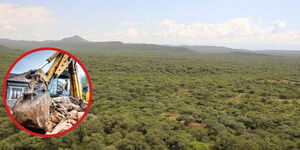A group of women from the Northern part of the country have taken upon themselves the responsibility of monitoring not only their livestock but wildlife as well, with special care on the wild elephants at the Samburu Liakipia corridor.
In a report done by the Daily Nation, Mama Tembo , a popular name given to the pioneer and team leader Mpayon Loiboitongo'o, 24, who was born and raised in Lerata, Samburu learned how to care and interact with Kenya's tuskers from her father while she was growing up.
''When I first encountered the elephants at a young age, I was terrified and ran back to my father, who later began to teach me on the various ways I can handle them and also protect them.''
She would later get signed up by the Save The Elephants charity after she had become a popular singer in her village where she was also charged with assisting Samburu warriors to monitor both the wildlife and livestock
''Towards the end of 2017, Save the Elephants came to our village to recruit people who would take care of the elephants. A meeting was held, and I was chosen as Mama Tembo unanimously, especially because I am a widow.''
Mpayon narrated that her journey began out of the unfortunate presumption of death of her husband who had left for the city to be a night guard and never returned.
The L’Tome Nkaina singer from Lolgereded told journalists that upon the death of her husband, she was left to fend for her children as a goat herder and musician passionate about conservation and celebrating culture.
''We still don’t know what happened to him. It broke me. I didn’t know I could move on or take care of our young family, but here I am.''
The Mama Tembo group she heads is in charge of keeping track of animal movements and give early warnings of attempts to create settlements on pathways used by elephants and other wildlife in the region.
In 2009 a report by Save the Elephants recorded what they termed as a spike in poaching rates in Samburu and published a warning in the journal Nature that East Africa’s protected areas were now in danger.












